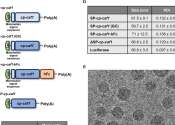Experimental antibiotic torpedoes the protective slime that makes resistant bacteria tougher to fight
An experimental antibiotic is under development that is capable of neutralizing a wide range of drug-resistant, Gram-positive bacteria—pathogens that protect themselves in a slimy shield, called a biofilm, designed by nature ...









